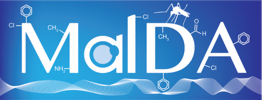A Novel Antiparasitic Compound Kills Ring-Stage Plasmodium falciparum and Retains Activity Against Artemisinin-Resistant Parasites.
Journal:
The Journal of infectious diseases, Volume: 221, Issue: 6Abstract:
Spreading antimalarial resistance threatens effective treatment of malaria, an infectious disease caused by Plasmodium parasites. We identified a compound, BCH070, that inhibits asexual growth of multiple antimalarial-resistant strains of Plasmodium falciparum (half maximal inhibitory concentration [IC50] = 1-2 µM), suggesting that BCH070 acts via a novel mechanism of action. BCH070 preferentially kills early ring-form trophozoites, and, importantly, equally inhibits ring-stage survival of wild-type and artemisinin-resistant parasites harboring the PfKelch13:C580Y mutation. Metabolomic analysis demonstrates that BCH070 likely targets multiple pathways in the parasite. BCH070 is a promising lead compound for development of new antimalarial combination therapy that retains activity against artemisinin-resistant parasites.
